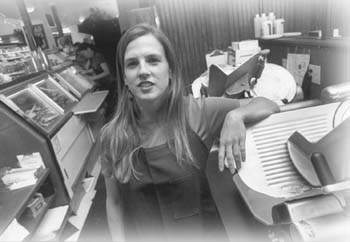![[MetroActive News&Issues]](/gifs/news468.gif)
![[MetroActive News&Issues]](/gifs/news468.gif)
[ Features Index | Metro Santa Cruz | MetroActive Central | Archives ]
Counter Culture
Degree of Difficulty: Selena Poon's UCSC bachelor's degree in women's studies landed her a job waitressing at Ming's Palace Restaurant in Soquel.
UCSC grads can be upbeat about job prospects--especially if they aspire to careers pulling espresso or pushing bagels
By Mary Spicuzza
IF HORATIO ALGER WERE LIVING IN Santa Cruz today, intent on pulling himself up by his Teva straps, he would no doubt march with his college degree to work at the nearest java joint or bagel shop. While mastering the art of the foamy latté or the chewy bagel, Horatio would make enough money to pay rent--barely--and still have free time to pursue his real interests. That is, if he were like one in four college graduates--who work in jobs that don't require a degree.
Recent articles in The New York Times, San Jose Mercury News and the Santa Cruz County Sentinel have sung the praises of opportunities open to this year's graduates.
"There shouldn't be a senior in America who wants a [professional] job that doesn't get one this year," prophesies Jim Greeley, director of career services at Merrimack College in Massachusetts, as quoted in the Sentinel. However, Greeley says he is mainly referring to students in economics, the computer sciences, engineering and other high-technology fields. Most Santa Cruz students haven't traditionally chosen pre-professional majors--so Greeley's assumption omits nearly 90 percent of UCSC graduates who head out into the jungle with degrees in fine arts, liberal arts or social sciences.
In one brochure, A University for the 21st Century, UCSC proudly announces the new Jack Baskin School of Engineering as its "first professional school."
Engineering majors may not dominate the campus, but Robert Clem, assistant director of the UCSC Career Center, says he is confident about job prospects for the Class of 1997.
"We are very optimistic about the market this year," Clem says. "The past three years have been great, ever since the Silicon Valley boom began. We are on an 'up' cycle, which has lead to increased opportunities in all fields."
Still, many recent graduates are left wondering when they will reap the benefits of a boom.
Selena Poon, a 24-year-old with a women's studies degree, says she doesn't feel the job market is quite so user-friendly.
"Everyone wants experience, which is difficult to get when you're in school full-time," she says. "A decent wage is hard to find, especially in tourist towns like Santa Cruz, where there are not many companies and tons of college graduates. The only private-sector opportunities available are computer jobs."
Poon says her studies did not prepare her for the local working world.
"Most bachelor's degrees are all about theory," she says. "I left UCSC knowing how to deconstruct, but without practical skills."
Poon worked for the UCSC Rape Prevention Center full-time after graduation, until its funding was drastically cut. While working there 20 hours a week, and after a short stint with another nonprofit group, she took a waitressing job at Ming's Palace Restaurant in Soquel to help support herself.
Articulate and sweet-natured, Poon summarizes the near-unanimous opinion of food service workers about the current career scene: "It sucks!"
Food Disservice
POON SAYS SHE HAS noticed an interesting power dynamic in the food-service industry. "People are not as gracious as you may think, especially when they're hungry," she says. Her dissatisfaction with the job was magnified by the fact that she was seen as a genuine Chinese girl working in a Chinese restaurant. "People saw it as so 'cute' that I was waiting on them and treated me like a little authentic bonus to their dining experience," she says, somewhere between irritated and slightly amused.
After two years in the real world, Poon says she's had enough. She'll be moving to San Jose and starting law school in the fall, where she hopes to pursue public interest or women's law.
Poon hopes law will be a way to contribute to society while making enough money to live comfortably. While her undergrad degree provided her with the ability to get into law school, it did not allow her to jump right into the job market--at least not with a real job.
This is not uncommon in Santa Cruz, which may hold some kind of record for the percent of the population employed in food service. A 1990 census shows that one-third of the county's population of 238,900 is college-educated, while 25 percent of Santa Cruz households make less than $20,000 a year.
But the numbers show that there is a national trend of college grads working "high school level" jobs that has been growing for more than 30 years. Today, there are more than 5.8 million college graduates who are unemployed or "educationally underutilized" in positions not requiring a degree, according to economist Kristina Shelley of the Bureau of Labor Statistics.
Explanations for this trend vary widely. Clearly the lowest wage bracket of the service sector has been the fastest-growing sphere of the job market. In a labor bureau report, the jobs projected to see the most growth by 2005 are as retail salespersons, waitresses, food preparation and service workers, nurses, cashiers, clerks, truck drivers and janitors.
"In 1948 there were only 9,723 Americans working in fast-food restaurants. By 1994 there were 2.9 million, making fast-food service the fastest growing U.S. industry in the postwar era," says Forbes magazine.
Forbes sees more McJobs as a sign of economic growth. UCSC labor economist and professor Lori Kletzer also feels that a growing service sector is not a bad thing, but rather "a sign of the increasing affluence of a nation."
Whatever. It is not the career goal most college graduates had in mind as they struggled through finals.
Slice of Life: Lara McQuade (UCSC Class of '94, Russian studies) says her deli job at New Leaf Market gives her time to pursue her true interests.
'Slackers' With a Cause
UCSC ECONOMIST KLETZER says the limited job market in Santa Cruz is nothing new. "Santa Cruz graduates have historically had to go to San Jose or San Francisco for career opportunities because of limited employment opportunities here," Kletzer says.
Better opportunities in Silicon Valley and San Francisco may explain why, out of 39,992 graduates, only 7,277 have chosen to remain in Santa Cruz County.
Brian Reed, a 24-year-old visual arts graduate, gets up with the sun most mornings to make sure Coffeetopia, a cafe on Portola Avenue near 41st, is ready to fuel the masses by 6am. By the time most Santa Cruzans are waking up, Reed has been working for hours, listening to Billie Holiday and the old big band.
Before taking this job, Reed says, he spent six months looking for a computer graphics position in San Jose. He found most of the entry-level positions had overwhelming numbers of applicants, and opted to skip the commute to the corporate world. Now he makes mochas instead.
"I've given up on the 9-to-5 job market," Reed says. "It's pretty bleak, and I wouldn't want to be a part of that world, anyway. I have no interest in becoming a drone."
Reed has a contagious smile and an easygoing demeanor, which, along with his intricate tattoos and multiple piercings, creates a nice-guy-with-an-edge vibe. He feels pretty comfortable in his current situation.
"I'm lucky," he says. "My boss and the people I work with are good people." He doesn't get benefits but makes $7/hour--a better wage than many food-service workers.
"Some of my prior food-service jobs in this town, including the last one, were pretty hellish," he says. "But I feel like I'm in a good situation now."
Reed says there is "a difference between my job and my work."
"My job is how I pay the bills, my work is what I do for myself." For him, that is creating art--computer graphics and pen-and-ink drawings.
Aside from economic factors, graduates like Reed have been opting for the non-corporate world since Dustin Hoffmann rejected a career in plastics in The Graduate. But never in such numbers.
Lara McQuade has worked in the deli at the Westside New Leaf Community Market for a little over a year. She graduated three years ago with an interdisciplinary major in Russian studies--a combination of literature, history, politics and language studies. She waitressed for some time after getting her degree, traveled to Brazil, and is now working and taking classes at Cabrillo College.
"If I could find work in my interests, the alternative health-care field, I would. But the market is so competitive here. At the same time," McQuade explains, "I'm not going to give up my dreams for a limiting 9-to-5 job I have no interest in just for the money."
The flexibility of food service allows her to take physiology and anatomy classes, and have time to still participate in Brazilian dance events in town.
Cafe Politics
P
IN THE EARLY '90s, author Douglas Coupland coined the term "Generation X," using the mathematic symbol of the unknown to represent a generation too diverse to categorize. The term has become a tool of hyped media generalizations, the subject of college classes and an image packaged and sold by advertisers--sometimes romantic, often derisive.
Twentysomethings today have been called lazy, numb--a bunch of tuned-out, doofus, self-centered know-nothings. Quite a little box for the nation's diverse generation of 75 million young people.
Twentysomethings working in jobs like food service are often seen as poorly motivated and poor career planners. They respond by pointing out that it's always been easier for society to find scapegoats rather than deal with its real problems.
The nation's economic problems are often cited in explaining why so many college graduates are asking the perpetual question, "Do you want everything on that?"
According to Geoffrey Holtz, author of Welcome to the Jungle: The Why Behind Generation X, downsizing--the "term of the nineties"--is the proverbial door-to-the-face for young graduates. Holtz is among those who believe that NAFTA is responsible for jobs lost as factories moved out of the country--leading to increased competition in the job market.
An increasingly competitive job market for college graduates is clearly a nationwide trend. In 1960, there were 392,000 bachelor's degrees awarded. By 1994, numbers had climbed to more than 1,182,000.
The professional job market may be on an "up" cycle this year. Still Kletzer says that if the change is to be meaningful, it has to be long-term.
If the boom really has been going on for several years now, it's news to many recent grads. The number of fresh college graduates in service jobs is still on the rise, leading to the emergence of a new culture of graduates doing time behind the counter.
Welcome to the new American service-sector dream. While experts tout increased job opportunities, the voices of that guy making your sandwich and the woman brewing coffee offer another perspective. As for the future, we'll probably have to wait and see. In the meantime, how 'bout a latté?
Copyright © Metro Publishing Inc. Maintained by Boulevards New Media.

Robert Scheer
Robert Scheer
From the June 12-18, 1997 issue of Metro Santa Cruz.